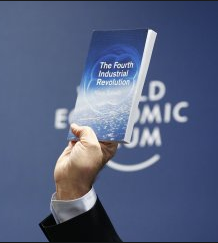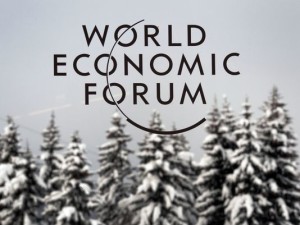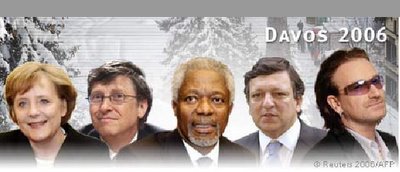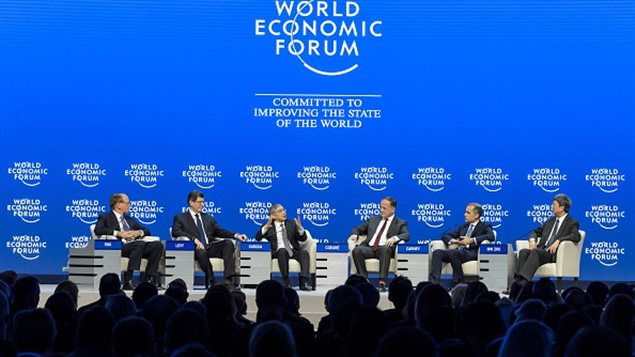For years, I’ve been decrying the hot air that passes for smart talk at the World Economic Forum in Davos, Switzerland. Here – from “Why All the Fuss about the World Economic Forum,” January 30, 2006 – is a sample of the informed contempt I developed over a decade ago.
_________________
The World Economic Forum … is an annual event at which corporate titans, international bankers, world leaders, and a smattering of celebrity do-gooders gather to bloviate about the impact of worldwide developments on their respective businesses, personal wealth, and collective conscience. Politicians and celebrities change from year to year, but the regulars are invariably the same CEOs, investors, and managers who represent the world’s super rich.
The forum is promoted as ‘impartial and not-for-profit; it is tied to no political, partisan or national interests.’ But movers and shakers know the reason an invitation to this retreat is so coveted is that it’s a rare (and rarified) opportunity to see, and to be seen amongst, the people who really rule the world. And, the PR value of such images alone is priceless…
The wealthiest one percent would have the rest of us believe that Davos is all about addressing world economic problems that affect our lives. That’s why the most talked-about feature of their gathering is not the (main-event) schmooze-fests for business opportunities; rather, it’s the (undercard) gabfests for charitable causes – at which invited guests sit on panels and blow hot air on issues like climate change and the plight of the poor.
__________________
This is why I am so heartened that no less a paper than the Financial Times (FT) is now vindicating my contempt for the self-regarding farce this forum has always been.
In a column titled “Boneheaded Aphorisms from Davos’s Windy Summit,” January 31, 2016, the paper’s associate editor, Lucy Kellaway, ridiculed the perceived wisdom speakers dispense like manna from heaven.
 She littered it with their pithy sayings, which she described as “variously moronic (‘The fourth industrial revolution should be a revolution of values’), silly (‘Let’s put our optimism goggles on’), or empty (‘We are not the prisoners of a predetermined future’).
She littered it with their pithy sayings, which she described as “variously moronic (‘The fourth industrial revolution should be a revolution of values’), silly (‘Let’s put our optimism goggles on’), or empty (‘We are not the prisoners of a predetermined future’).
To be fair, alcohol flows at this forum as freely as snow falls in the Swiss Alps. Therefore, Davos attendees may well claim that such quotes were alcohol induced and “selected maliciously to make the speakers look foolish.”
Except that here is what animated this seminal FT column:
I now discover [that these quotes] were specifically picked by the World Economic Forum not as the stupidest things famous people said at Davos 2016, but as the smartest.
Most disturbingly – given that Davos is kept afloat on corporate money – every quote devoted to business in not just empty, but wrong…
The prize for the most boneheaded quote goes to Dan Schulman, CEO of PayPal, who said: ‘The biggest impediment to a company’s future success is its past success.’
Kellaway duly debunked Schulman’s bone-headedness by noting that past success is actually the best indicator of future success.
More to the point, though, she added that the 35 quotes forum organizers picked to highlight the wisdom speakers imparted were “almost all as dismal” … and wrong.
Is it any wonder the 2008 financial crisis exposed so many acclaimed geniuses in business and finance as little more than wizards living in a real world of Oz? What’s more, this FT column implies that there are still many of them out there, blithely doing all they can to plunge the world into another financial crisis.
 Meanwhile, apropos of hot air, Davos attendees are flaming hypocrites too. After all, the ever-looming apocalypse of climate change always features in their panel discussions. Yet reports are that as many as 1,700 private jets crisscross the pristine Alps each year, taking them to and fro:
Meanwhile, apropos of hot air, Davos attendees are flaming hypocrites too. After all, the ever-looming apocalypse of climate change always features in their panel discussions. Yet reports are that as many as 1,700 private jets crisscross the pristine Alps each year, taking them to and fro:
To hear these rich folks lamenting about the depletion of the ozone, the increasing gap between haves and have nots, and the almost criminal waste of non-renewable energy, one would think they jet-pooled to Davos on ethanol-fueled airplanes; whereas they all flew in on gas-guzzling, air-polluting private jets.
(“Attendees Emit More CO2 than Solutions at Davos World Economic Forum,” The iPINIONS Journal, January 29, 2007)
Hence my lament about the more the rich talk about helping the poor, the richer the rich become.
Alas, c’est la vie; plus ca change.
Related commentaries:
Why all the fuss…
More CO2 than solutions…


